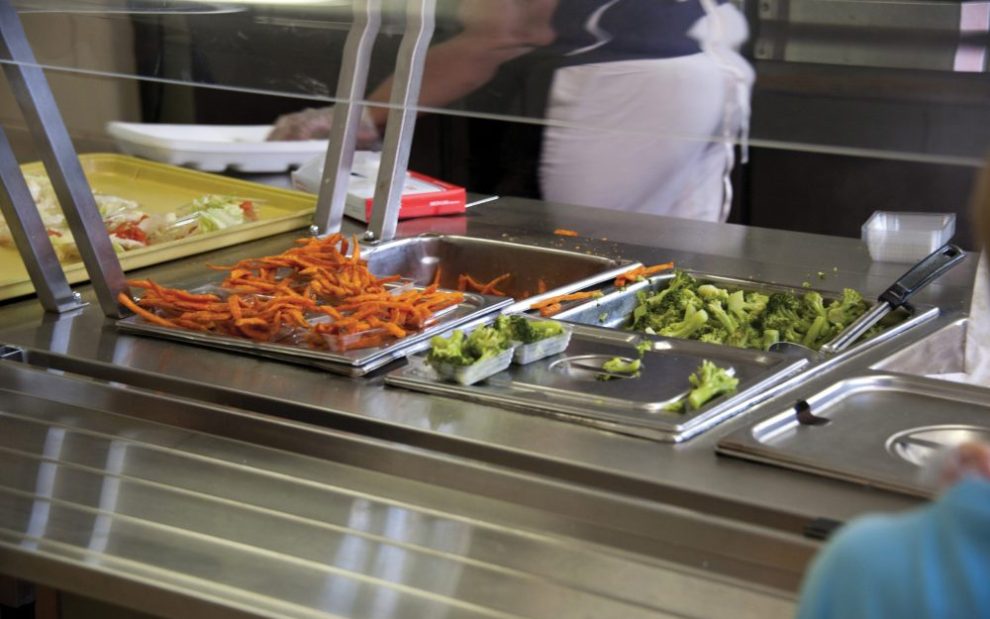My friend Beryl is what’s known as a super-ager. At 90, she’s as spry and adventurous as many half her age. Scientists are actually studying her to figure out how people such as Beryl remain vigorous at an age when many of us may not expect to be above ground. Recently, when I visited her in the Bay Area, she tied on her sneakers and we went walking up and down the famously steep San Francisco hills. Which is to say, I was walking; Beryl was charging. Twenty-five years younger, I gasped for breath the whole time as I labored to keep up. Meanwhile, Beryl carried on a lively commentary about the neighborhoods we were visiting as if we were sitting calmly in her parlor having tea.
Among the things Beryl does to keep active in her retirement is volunteer a few times a week at St. Anthony’s Dining Room. The Franciscans who run the place explicitly don’t call it a soup kitchen. Nor do they refer to the patrons as clients. “Dining room” suggests people gather there to share a meal, and “guests” are warmly welcomed. Beryl asked if I cared to serve a shift with her while I was in town to meet some of her friends. The glow on her face as she issued this invitation suggested I was being offered a special opportunity, which in fact I was.
The atmosphere in the dining room was buoyant. St. Anthony’s is orchestrated like a well-run liturgy, and I sensed something almost eucharistic going on. After a brief organizational meeting with the shift captain, we volunteers were divided into cooks, servers, greeters, and bussers. While most guests were able to stand in line with their trays and select their own meal from the servers, some folks arrived in wheelchairs, with walkers or canes, or otherwise too encumbered to make the journey around the dining room. These guests were invited to be seated at once, and we servers brought their meal to them.
One thing is for sure in this world: The fewer advantages you have, the fewer choices you enjoy. That’s why St. Anthony’s less-mobile guests are presented with a laminated photograph of the day’s menu at tableside so they can select which items they would like to eat. They can also have as many servings as they please, which is why some bring Styrofoam clamshells to take an additional meal home with them—or to share with someone unable to come or who may be uncomfortable with entering the dining room themselves.
An elderly volunteer, introduced as a sort of mystic monk, stood off to the side and handed out rosaries to anyone who asked for one. A surprising number did. Whether they intended them for prayer, as a talisman, or for decoration seemed irrelevant. It seems to me that if car owners can dangle rosaries so casually from rearview mirrors, an unhoused person might just as meaningfully hang one from a backpack or shopping cart for safety.
Some guests were affable and chatty with the servers, ready to give or receive a hug. Others avoided eye contact and sat as far from the comradery as possible. One such woman arrived pulling a red wagon. She’d torn up a pink sheet to adorn her hair with perfectly uniform bows. The same bows extended down through the buttonholes of her long coat. Pink bows adorned the netting over her wheelbarrow, holding all of her belongings in place. The overall impression was so artistic, not to mention meticulous, that Beryl attempted to convey our appreciation of her stylish presentation. The woman hurried past as if compliments were so many spiders cast in her direction. Who knew what injuries had led her to this depth of distrust?
Not all of the guests were necessarily without lodging. Some just needed a warm meal before the next payday or social security check. Young families brought small children: extra cookies and bananas were popular items. Others came for the showers available across the street, to visit the clothing room, or to meet with a social worker and stop for a meal on the way out. Many people knew one another, so the draw may have been simply not having to eat yet another meal alone.
There were funny moments. When I showed one man the laminated meal chart for the day and asked what I might bring him, he replied without hesitation, “A lobster salad and a glass of good chardonnay.” We both laughed, and I admired his excellent taste. Then he bowed his head humbly and said, “I would be glad to have whatever’s being served today.”
As I write this, I’m munching on a few cellophane-wrapped crackers, a gift from one of the guests. This fellow, who did not speak English, was clearly excited to be sharing a meal with us. He was further overjoyed to learn, after consuming his first plate, that he could have more. When I brought him a second tray, he reached eagerly into his pockets and pulled out packets of crackers, pressing them into my hand. Someone explained that he’d gotten them from the hospital: The cast on his foot revealed the nature of the visit. I swallowed a lump in my throat, accepting the gratitude of a man who gave what he had and surrendered it so freely.
Why am I telling these stories? Partly because I can’t forget them. I can’t forget the faces, the exchanges. The young man with the mental disability who kept standing up, wiping down all the surfaces around him, packing up his food carefully in a backpack, then unpacking it, sitting down, and repeating the whole process. Or the man who was seven-and-a-half feet tall—he stood up and towered over me to prove it—then displayed his size 18 sneakers and, beaming, declared that a local basketball team donated his size regularly to the clothing room.
I remember the weary sex workers, the wary transgender folk, the teenagers who figured they have a better chance of surviving the streets than their families. I think of the monkish man handing out free rosaries, the pink-bow woman, the cracker man, and the gentleman who preferred a good wine. And I understand why Beryl wanted so much to introduce me to her friends, why a 90-year-old woman walked 12 blocks each way several times a week to have this experience.
In this month’s lectionary readings, Jesus talks about the generous landowner who pays everyone the same wage whether they worked all day or just for an hour. The last will be first, Jesus assures us. And the opposite is just as true.
I think of the guests who shared a meal that day in a center-city dining room. The world might assign some of these folks to the back of the line. Yet in that hour and in that special place of hospitality, these guests came first. We servers experienced a smidgeon of kingdom reality, hurrying to supply extra napkins while our guests rested for a gracious hour and were served with a cheerful smile and personal attention.
It occurred to me more than once: This is how God sees the world. These disadvantaged ones are precious in God’s eyes, honored guests in a kingdom without end. Someday the tables will be literally turned. The liturgy celebrated at St. Anthony’s dining room will be the only eucharist in town.
This article also appears in the September 2023 issue of U.S. Catholic (Vol. 88, No. 9, pages 47-49). Click here to subscribe to the magazine.
Image: Unsplash/CDC














Add comment